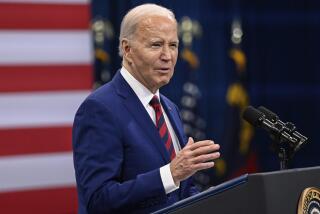Establishment Republican defeats tea party foe in Alaska Senate race

The tea party’s victory drought against establishment Republicans persisted in the hard-fought battle for the GOP nomination for a U.S. Senate seat in Alaska, as former state Atty. Gen. Dan Sullivan defeated tea party favorite Joe Miller.
Sullivan, who faced not only two prominent Republicans but an avalanche of Democratic spending intent on denying him victory Tuesday, will take on Democrat Mark Begich, a first-term incumbent who glided to his party’s nomination.
In a post published Wednesday on his campaign’s Facebook page, Sullivan said his supporters “knocked on tens of thousands of doors, made hundreds of thousands of phone calls, and reached our fellow Alaskans with our message of less government and more freedom.”
“I’m deeply humbled by the trust Alaskans have placed in me, and together we can get our state, and our country, back on track,” he said.
In a statement on his website earlier Wednesday, Miller said he had called Sullivan to congratulate him.
“As Ronald Reagan reminded us, ‘Freedom is never more than one generation away from extinction,’ so I will continue to do my part to ensure it is alive and well and passed on to the next generation of Americans,” he said.
The stakes in Alaska’s GOP primary extended far beyond the state’s reach to the national efforts by the party to take over the Senate. The seat held by Begich has long been among those most pursued by Republicans as they seek the six needed to wrest control of the upper house.
And because of the national dynamic, Alaska made an enticing locale for the familial GOP squabbling that has marked this primary season.
In contrast with the two most recent campaign cycles, when tea party candidates squeaked through to win nominations only to prove wanting in November, establishment Republicans mounted a more robust defense early on of those whom they saw as the strongest general election candidates.
Among others, the party’s Senate leader, Mitch McConnell of Kentucky, defeated a tea party challenger, as did other once-threatened senators like Lindsey Graham of South Carolina and Thad Cochran of Mississippi.
In Alaska, the establishment fell in line behind Sullivan, eager to prevent the GOP bloodletting that accompanied the 2010 contest. That year, Miller stunned the state by knocking off incumbent Lisa Murkowski in the primary, but she won reelection by waging a write-in campaign in the fall.
The best-financed of the candidates, Sullivan received help from conservative groups such as American Crossroads and the Club for Growth, according to data compiled by the Center for Responsive Politics.
But he got a taste of the general election in the barrage from an independent group, Put Alaska First PAC, a “super PAC” that received much of its funding from the liberal Senate Majority PAC, which seeks to keep the Senate in Democratic hands.
The Democratic interference was meant to hand the nomination to Miller, whom they judged the weakest candidate against Begich, or foment the sort of multi-candidate free-for-all that Miller kicked off in 2010.
Republicans won a small victory late in the race when Miller said he would support the party nominee, regardless of who it was — although, he said, he was confident it would be him.
Miller, a distant third in GOP fundraising, sought to take advantage of a late endorsement by the state’s former governor, Sarah Palin, although it clearly did not generate the momentum he hoped it would.
More to Read
Start your day right
Sign up for Essential California for news, features and recommendations from the L.A. Times and beyond in your inbox six days a week.
You may occasionally receive promotional content from the Los Angeles Times.







